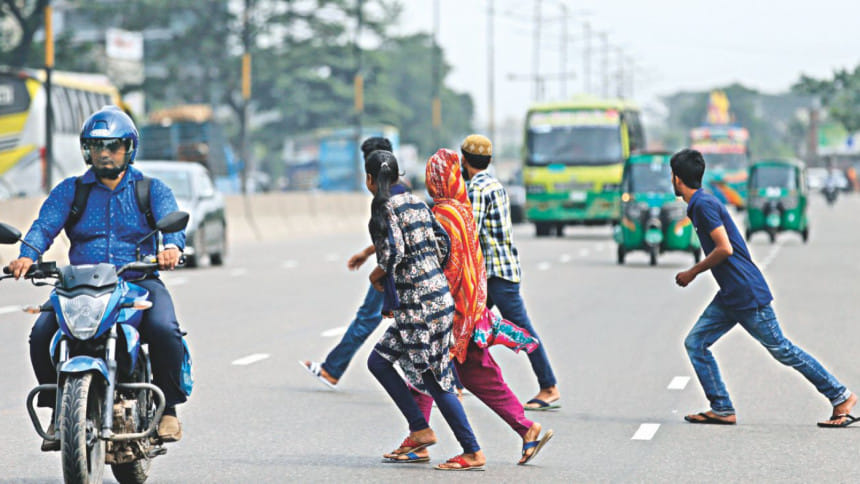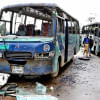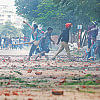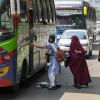Cleaning up Transport Mess: Some efforts, little change

In the wake of the student agitation for safe roads, some efforts have been made to correct the ills in the otherwise disorderly public transport system though the situation remains mostly as usual in the capital.
Yesterday, a number of public buses continued to ply the city streets without legal documents, and pick and drop off passengers on roads randomly. People were still risking their lives to cross busy thoroughfares. Bikers rode motorbikes on footpaths to avoid traffic jam -- all too common pictures on the city streets.
However, some different scenes were also there.
In many parts of the city, police were seen strictly enforcing the traffic rules as they have been conducting a weeklong special drive against errant drivers.
Motor vehicle users in large numbers turned up at the Bangladesh Road Transport Authority (BRTA) offices across the country to either update or get necessary documents.
The associations of transport owners and workers were checking the licences of drivers and pressing the members to obtain legal documents for their vehicles.
Action was taken against some of the owners for violating the associations' decision to end the practice of having daily contracts with bus drivers and helpers.
The developments came more than a week after school and college students began demonstrations demanding concrete government steps to improve road safety following the deaths of two of their peers in a city road crash on July 29.
Dia Khanam Mim and Abdul Karim Rajib were killed on the spot as a Jabal-e-Noor bus ploughed through a crowd while competing with another bus of the same company. It was later revealed that a third bus was also involved in the race.
The accident ignited fury among students, mostly in their mid-teens, who defied pouring rain to take to the streets of Dhaka city with slogans "we want justice", bringing traffic to a standstill.
Following the movement, the government, and transport owners and workers took up several measures to improve the situation on roads.
But still things have not changed that much with the authorities pointing out that the problems and mismanagement that continued for years cannot be removed overnight.
YESTERDAY'S TRAFFIC SITUATION
Around 2:30pm, scores of people were seen waiting for buses at Farmgate, one of the busiest areas in the city.
Whenever a bus came, people tussled to get into it.
Though there are three footbridges in the area, many crossed the busy road, ignoring the risk of being hit by a vehicle. As the number of buses was small due to the ongoing police drive, people had to pay two or three times the usual fares for CNG-run auto-rickshaws to reach their destinations.
Earlier, two bicyclists were using the wrong side of the road at the Science Laboratory intersection around 10:00am. Traffic police stopped them and forced them to use the right lane. In a rare display of discipline, bikers were seen moving in lines.
The picture was different in Kazipara and Shewrapara areas.
Around 1:00pm, a correspondent of this newspaper found rickshaw-pullers pulling haphazardly without maintaining any line, leading to traffic congestion in the two areas. Buses were picking and dropping off passengers here and there. There was no discipline at all on the road, part of which has become off-limits for construction of metro rail.
Zina Tasreen, a private service holder who frequently uses the Airport Road, said, “Buses are still racing on the road. Bikers still drive roughly, spilling into the pavement and barging into pedestrians.”
She said she saw people crossing the road amidst speeding traffic instead of using nearby footbridges.
However, Biplob Rahman, another private service holder who regularly uses public transport in Mirpur area, said, “I saw some people using zebra crossing. Some others refrained from using mobile phones while crossing roads,” he said.
“I even heard a rickshaw-puller asking another to follow the right lane, which is quite rare,” he said.
CASES AGAINST RULE BREAKERS
In the first five days of the Traffic Week, police collected more than Tk 3 crore from different vehicles for violating traffic rules across the country.
The Traffic Week that began on August 5 ends tomorrow.
''We fined different vehicles Tk 3,11,31,698 till today [Thursday] for violating traffic rules,” Mohammad Sohel Rana, assistant inspector general at the Police Headquarters, told this newspaper.
Over the last five days, the traffic police filed cases against 97,046 vehicles for breaking traffic rules in six metropolitan police areas, and eight ranges and highway ranges, he said.
Besides, law enforcers seized 3,255 vehicles, and legal action has been taken against 34,321 drivers for breaching traffic rules such as driving vehicles on the wrong side, using hydraulic horns and for not carrying documents while driving, mentioned the official.
''Violation of traffic rules is an old problem in the country. Police are trying their best to improve the situation. However, it is not possible to solve the problem overnight,” he added.
Meanwhile, three mobile courts of the BRTA filed cases against 53 vehicles in the capital and nearby areas, and realised Tk 1.1 lakh in fine from traffic rule violators.
They also jailed 19 middlemen for various terms.
Talking to The Daily Star, BRTA spokesperson Mahbub-e-Rabbani said a huge number of people thronged different BRTA offices across the country to update their vehicle-related documents.
“We see a change among people. Bus owners are also trying to fix their problems following the protests,” he added.
ASSOCIATIONS CHECK DOCUMENTS
As per their earlier decisions, representatives of transport owners and workers associations checked driving licences, registration and other documents of buses before allowing those to leave terminals in the capital.
Around 1:30pm at Mohakhali Bus Terminal, a correspondent of this newspaper saw two transport association members checking six types of documents -- licence, blue book, tax token, fitness clearance, route permit and insurance.
Tariqul Islam Tareq, office secretary of Mohakhali Bus Terminal Owners' Association, said that till 2:00pm, they had checked documents of 300 vehicles and found that 260 of those were okay.
Around 40 vehicles were not allowed to operate as their documents were not updated, he said.
At an emergency meeting on Wednesday, Dhaka Road Transport Owners' Association, a platform of Dhaka-based 2,400 bus owners, decided to check the documents so that no unfit bus can operate in the city.
Abul Kalam, president of the association, claimed that documents of most of the buses at Mohakhali terminal were okay but there were problems with drivers' licences.
Almost 70 percent of the drivers had licences either for light or medium vehicles, meaning they were not eligible to drive buses, he pointed out.
Karam Ali, general secretary of Bangladesh Road Transport Workers' Union, said they also checked documents at Sayedabad and Gulistan bus terminals.
Khondaker Enayet Ullah, general secretary of Bangladesh Road Transport Owners' Association, said they cancelled membership of five bus companies for violating the decision to discontinue the practice of daily contracts with bus drivers and helpers.
“They [five companies] were still operating buses under daily contracts, defying our decision [made on Wednesday]. So, we cancelled their membership,” he added.
The companies that have more than 400 buses are: Azmeri, Skyline, DMK, Supravat and Gabtoli-Sadarghat Paribahan (bus number 7).
Many bus owners rent out vehicles to drivers under daily contracts. In this practice, a driver pays a specific amount to the owner and to maximise profits they often drive recklessly to make as many trips as possible in a day.
Enayet said that to implement their decisions, they yesterday formed four teams that start working today.

 For all latest news, follow The Daily Star's Google News channel.
For all latest news, follow The Daily Star's Google News channel. 








Comments